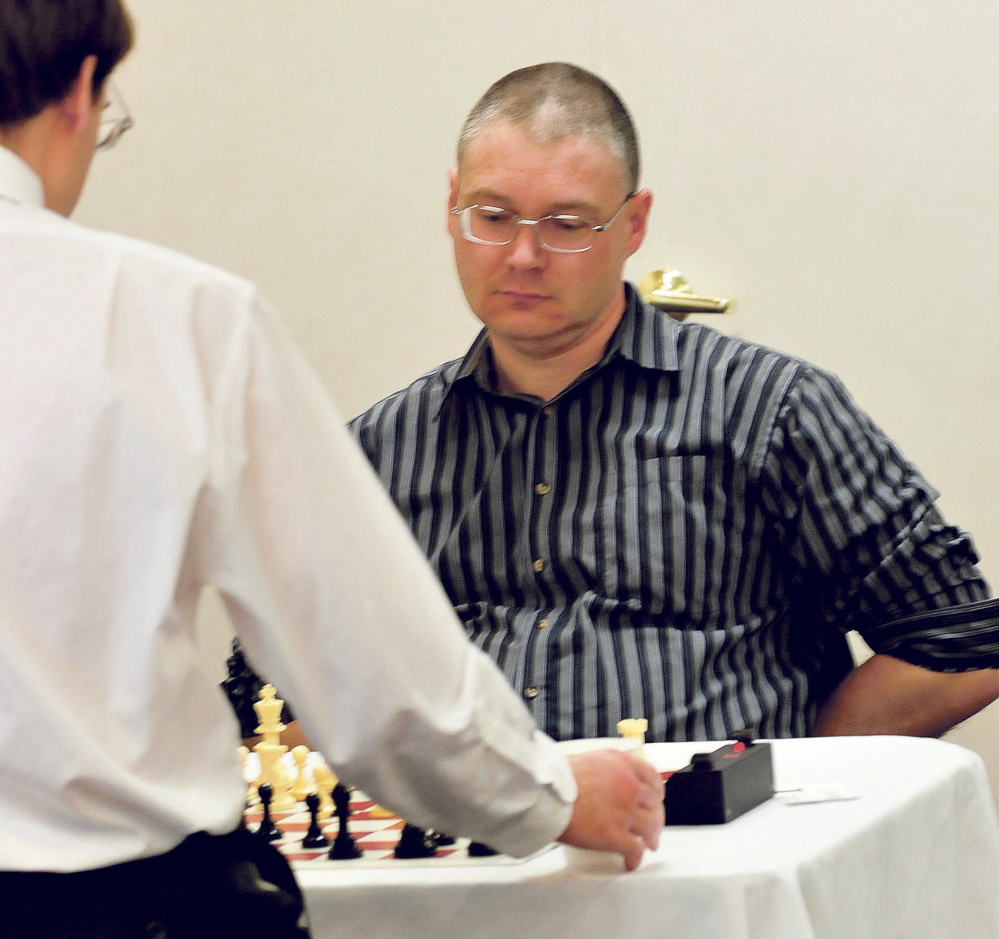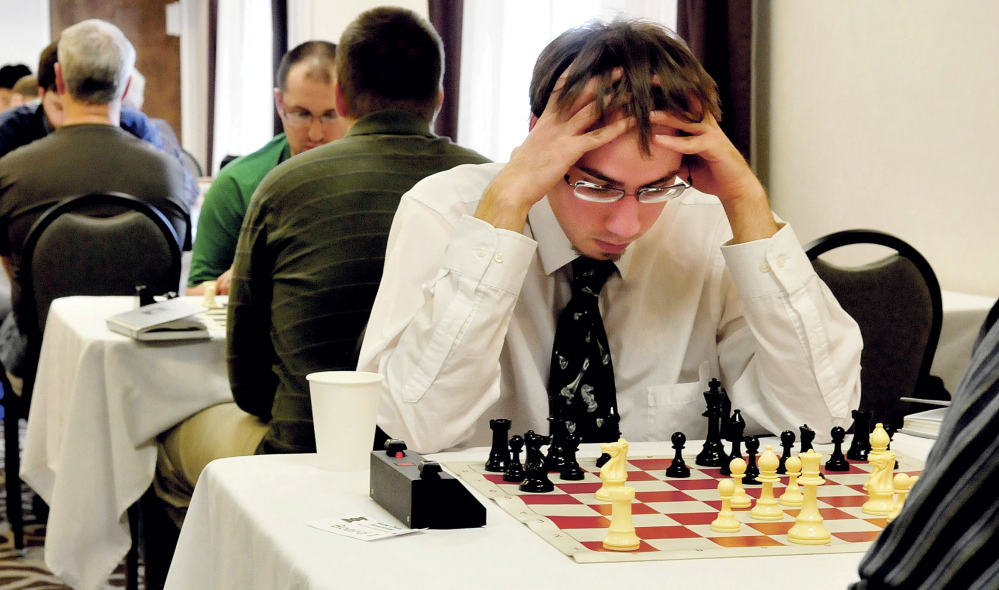WATERVILLE — Talk to any chess enthusiast and he’ll likely say the game is both compelling and challenging.
“It’s a very complex game,” says Jarod Bryan, 47, of Augusta. “It’s abstract. Creativity is a big part of it, I believe. Also, it’s very logical, so if you’re good in mathematics, science — any kind of logical field — you are likely to excel in chess. It’s my favorite hobby. It’s a way to challenge the mind.”
Bryan on Sunday won his seventh state chess championship in about 30 years after competing in the Maine Closed Chess Championship held Saturday and Sunday at Best Western Plus Waterville Grand Hotel on Main Street.
Chess is a two-person game played on a checkered board, where a player uses 16 pieces to capture his opponent’s pieces while defending his own from being taken.
In the final round, Bryan played against Aaron Spencer, 23, of Bangor, who in 2012 tied for first place in the event.
“It’s beautiful,” Spencer said of chess. “It’s challenging and it really integrates a lot of different types of people and personalities. It attracts artists, competitive athletes. It’s kind of the perfect marriage of mathematics and poetry in my mind. It’s beautiful and precise at the same time.”
Twenty-eight people entered the weekend event, but four dropped out, leaving 24 going into Sunday’s games.
Around noon Sunday, six sets of players sat at tables in a large, quiet room at the hotel, focused only on the board and chess pieces. Spectators milled around, watching their moves.
They were all members of the Maine Chess Association, which has hosted championship games since 1942. The tournament was closed, meaning it was open only to association members.
“Each game is four hours,” said tournament director Lee Doucette, 67, who also is association secretary. “If you play three games in a day, you’re looking at 12 hours of just raw brain energy.”
A 35-year chess player himself, Doucette explained around noon that Bryan was ahead by four points in the weekend’s tournament and would be playing the last round with a 1-point lead on everyone else. That round started around 2 p.m.
It had been a long two days. Saturday’s first round started at 9 a.m. and players left around 10:30 p.m. Sunday’s games also started at 9. Bryan received a trophy, $200 and a plaque.
Doucette said chess players tend to be analytical and like to solve puzzles.
“Basically, chess is a puzzle that changes,” he said. “With every move, it becomes a new puzzle. Anybody who likes to be challenged to come up with a solution generally enjoys chess.”
A computer analyst, Doucette said he started playing chess while in high school and has been playing competitive chess 35 years. He said people of all ages and from a variety of professions, including janitors, carpenters, engineers, doctors, lawyers and students, play chess.
John Engle, 76, of Waterville, was competing in the event. A retired medical doctor, Engle is a member of the Waterville Chess Club, which meets from 6 p.m. to 11 p.m. Mondays at the First Baptist Church. He started playing chess seriously when he moved to Waterville in 1979, he said.
The second-oldest competitor in the weekend tournament, Engle said he was not playing so well.
“I played three games yesterday. I lost to two higher-rated players and a lower-rated player,” he said. “Today, my opponent didn’t show up, so I got one point for forfeit.”
Players are ranked by points they earn based on performance in tournaments. A player who earns 2,200 points is considered a master.
“I used to be in the middle of the bell-shaped curve for rating in the 1400s,” Engle said. “Lately, I’ve slipped back to the 1200s.”
Engle plays chess on the Internet about every day.
“It’s the greatest game — it’s like mental karate,” he said.
Bryan, the champion, is a U.S. Chess Federation national master who started playing chess while a sophomore at Cony High School in Augusta where he was a member of the chess team coached by Duane Mercier.
“We had some excellent players,” he said. “We went to the nationals in 1985 and we were third that year.”
A data analyst, Bryan studied mathematics at University of Maine, Orono, and is a member of the Augusta Chess Club, which meets 6:30 p.m. Tuesdays at Barnes & Noble and welcomes new members, he said.
“It’s a good game to keep your mind sharp, if you like logical games — games that involve a significant amount of creativity. It’s really a sport. It’s a combination sport/art science. Personally, I classify it as a mental sport because of the amount of effort you have to put into the game at the top level.”
He says chess will never be a “completely solved game.”
“Computers will never be able to calculate every possible game.”
Meanwhile, Spencer said he learned how to move chess pieces at nine or 10 and began playing the game at 14.
An inventory taker for Retail Grocery Inventory Service, Spencer is a 2010 graduate of John Bapst Memorial High School in Bangor where he was a member of the chess team, coached first by Bob Solinger and then Uri Riabkov. He studied mathematics two years at UMO, took some time off to work and coach chess, and plans to resume classes, he said.
“I’d love to be able to coach chess full time,” he said. “It’s kind of a pipe dream. I’d love to make a living from chess.”
He said he recommends the game to those who have never played.
“Anybody can learn to be a pretty acceptable player,” he said. “It takes effort and it takes passion.”
Amy Calder — 861-9247
Twitter: @AmyCalder17
Send questions/comments to the editors.





Success. Please wait for the page to reload. If the page does not reload within 5 seconds, please refresh the page.
Enter your email and password to access comments.
Hi, to comment on stories you must . This profile is in addition to your subscription and website login.
Already have a commenting profile? .
Invalid username/password.
Please check your email to confirm and complete your registration.
Only subscribers are eligible to post comments. Please subscribe or login first for digital access. Here’s why.
Use the form below to reset your password. When you've submitted your account email, we will send an email with a reset code.